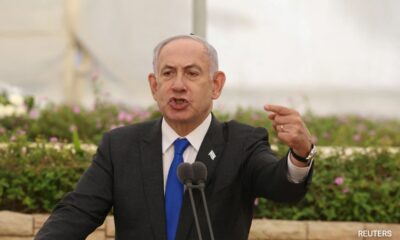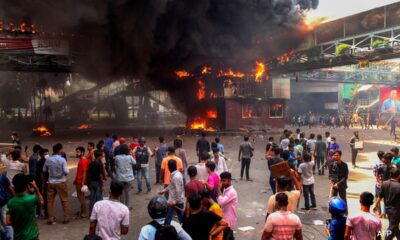World News
Columbia University suspends protesters of Israel-Hamas war

NEW YORK (AP) — U.S. colleges called on pro-Palestinian student protesters to clear tent camps with increasing urgency Monday as police arrested more demonstrators at the University of Texas and Columbia University said it began suspending students who defied an ultimatum to disband the camp there.
Dozens of law enforcement officers, many in riot gear, confronted protesters as they returned to the University of Texas at Austin on Monday. They quickly arrested six protesters and took others into custody one by one. Officers used pepper spray after a group of protesters blocked the path of a police van carrying arrested demonstrators. The crowd retreated but continued to block the campus exit. Officers then used two flash explosives to clear a path for the van to leave.
Republican Governor Greg Abbott posted a video on social media of soldiers arriving on the campus of 50,000 students. “No encampments will be allowed,” Abbott said. Just last week, hundreds of police confronted protesters at the university, arresting 34 people.
In Columbia, student activists defied the 2 p.m. deadline to leave an encampment of about 120 tents on the school’s campus in Manhattan. Instead, hundreds of protesters marched around the quad, clapping, singing and weaving around piles of temporary flooring and green carpeting meant for the graduation ceremonies scheduled to begin next week.
A handful of counter-protesters waved Israeli flags, and one held a sign that read: “Where are the anti-Hamas chants?”
The university did not call the police to summon the protesters. But three hours after the deadline passed, school spokesman Ben Chang said Columbia had begun suspending students. He does not want to say how many students are involved. He also did not say how the suspensions would be implemented or whether suspended students would be removed from campus.
Chang said that while the university valued students’ freedom of expression, the encampment was a “noisy distraction” that interfered with teaching and preparation for final exams. The protests also made some Jewish students feel very uncomfortable, he said.
Protest organizers said they were not aware of any suspensions as of Monday evening.
The notice sent to protesters earlier Monday stated that if they left by the deadline and signed a form committing to adhere to university policies until June 2025, they would end the semester in good standing can close. If not, the letter said, they would be suspended pending further investigation.
Early protests in Columbia led to the same thing pro-Palestinian protest camps in schools in the US. Students and others have been fighting over the war between Israel and Hamas and its rising death toll. Many students demand their universities sever financial ties with Israel. The number of arrests on campuses across the country is approaching 1,000. The protests have even spread to Europe French police remove dozens of students from Sorbonne University after pro-Palestinian demonstrators occupied the main courtyard.
The semester is coming to an end and campuses are preparing for graduation ceremonies, giving schools extra incentive to vacate their encampments. The University of Southern California has canceled its main graduation ceremony.
But students dug in their heels at some high-profile universities, while impasses also continued at Harvard, the University of Pennsylvania, Yale and others.
Protesters in Yale set up a new camp with dozens of tents on Sunday, nearly a week after police arrested nearly 50 people and cleared a similar tent camp nearby. They were told by a Yale official that they could face disciplinary action, including suspension, and possible arrest if they continued.
Yale said in a statement Monday that while it supports peaceful protests and freedom of expression, it will not tolerate policy violations such as the encampment. School officials said the protest is taking place near residential colleges where many students study for final exams, and that permission should be granted to groups to organize events and set up structures on campus.
In a rare case, Northwestern University said it had reached an agreement with students and faculty who represent the majority of protesters on its campus near Chicago. It allows peaceful demonstrations through spring classes June 1, requires the removal of all tents except one for aid, and limits the demonstration area to students, faculty and staff only unless the university approves otherwise.
At Brown University in Rhode Island, school President Christina H. Paxton offered protest leaders the opportunity to meet with officials to discuss their arguments for divesting from Israel-linked companies in exchange for ending an encampment.
In the letter to student protesters in Columbia, school officials noted that exams are beginning and graduation is coming.
“We urge you to remove the encampment so that we do not deprive your fellow students, their families and friends of this momentous event,” the letter said.
The demonstrations have led Columbia to hold classes remotely. The school said in an email to students that bringing back police “at this time” would be counterproductive. The university said it will provide an alternative venue for the protests after exams and graduation.
Columbia’s handling of the protests has prompted federal complaints.
A class action lawsuit on behalf of Jewish students alleges breach of contract by Columbia, claiming the university has failed to maintain a safe learning environment despite policies and promises. It also challenges the elimination of in-person classes and seeks swift legal action requiring Columbia to provide safety for students.
Meanwhile, a legal group representing pro-Palestinian students is urging the U.S. Department of Education’s civil rights office to investigate Columbia’s compliance with the Civil Rights Act of 1964 over the way they have been treated.
A university spokesperson declined to comment on the complaints.
The fate of the arrested students has changed a central part of protests, with students and a growing number of teachers demanding amnesty for protesters. At issue is whether the suspensions and legal records will follow students throughout their adult lives.
Protesters on other campuses, meanwhile, said they would stand firm. Jacob Ginn, a second-year sociology student at the University of North Carolina, said he had been protesting the encampment for four days, including negotiations with administrators on Friday.
“We are prepared for anything and we will stay here until the university meets our demands and we will remain steadfast and strong in the face of any brutality and repression with which they try to attack us,” Ginn said, referring to a possible police inspection. of the encampment.
Mattise reported from Nashville, Tennessee. Associated Press journalists from around the country contributed to this report, including Jim Vertuno in Austin, Texas; Sarah Brumfield in Silver Spring, Md.; Christopher Weber in Los Angeles; Carolyn Thompson in Buffalo, New York; David Collins in Hartford, Conn.; Makiya Seminera in Chapel Hill, North Carolina; and Corey Williams in Detroit.













